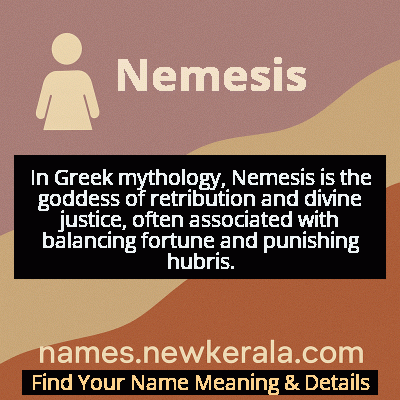Nemesis Name Meaning & Details
Origin, Popularity, Numerology Analysis & Name Meaning of Nemesis
Discover the origin, meaning, and cultural significance of the name NEMESIS. Delve into its historical roots and explore the lasting impact it has had on communities and traditions.
Name
Nemesis
Gender
Female
Origin
Greek
Lucky Number
3
Meaning of the Name - Nemesis
In Greek mythology, Nemesis is the goddess of retribution and divine justice, often associated with balancing fortune and punishing hubris.
Nemesis - Complete Numerology Analysis
Your Numerology Number
Based on Pythagorean Numerology System
Ruling Planet
Jupiter
Positive Nature
Optimistic, inspirational, and creative.
Negative Traits
Scattered, exaggerating.
Lucky Colours
Yellow, gold, purple.
Lucky Days
Thursday.
Lucky Stones
Yellow sapphire.
Harmony Numbers
1, 2, 9.
Best Suited Professions
Arts, writing, communication.
What People Like About You
Creativity, optimism.
Famous People Named Nemesis
Nemesis (Mythological)
Greek Goddess
Divine enforcer of moral balance and punisher of hubris in Greek mythology
Nemesis (Literary Archetype)
Literary Figure
Influenced Western literature as the embodiment of poetic justice and retribution
Nemesis (Gaming Icon)
Video Game Character
Became one of the most recognizable antagonists in survival horror gaming history
Name Variations & International Equivalents
Click on blue names to explore their detailed meanings. Gray names with will be available soon.
Cultural & Historical Significance
Extended Personality Analysis
Those named Nemesis are typically characterized by intense moral conviction, strategic intelligence, and formidable determination. They possess a natural inclination toward justice and fairness, often serving as moral arbiters in their social and professional circles. Their personality combines analytical precision with deep emotional investment in their causes, making them both intellectually rigorous and passionately committed. While they can appear stern or uncompromising, this stems from their unwavering dedication to principle rather than personal rigidity. Nemesis-named individuals often demonstrate remarkable resilience in adversity and possess the courage to confront powerful opposition when they perceive injustice. They tend to be highly observant, with an ability to detect hypocrisy and moral inconsistency that others might overlook. Their strength lies in their capacity for sustained focus and their refusal to be deterred by obstacles or opposition. However, they must guard against becoming overly judgmental or developing a messianic complex, as their intense commitment to justice can sometimes blind them to nuance and compromise. In relationships, they value loyalty and integrity above all else and will fiercely protect those they care about from perceived threats or injustices.
Modern Usage & Popularity
In contemporary naming practices, Nemesis occupies a unique position as a powerful, unconventional choice that appeals to parents seeking names with mythological depth and feminist resonance. While statistically rare and not appearing in most official baby name rankings, its usage has gradually increased since the late 20th century, particularly among families with classical education backgrounds or interests in mythology. The name's modern appeal lies in its association with female strength, justice, and empowerment rather than purely negative connotations of vengeance. Popular culture, especially video games like Resident Evil 3: Nemesis and comic book characters, has introduced the name to wider audiences, though most parents choosing this name do so with full awareness of its mythological significance. It's particularly favored in academic, artistic, and progressive circles where non-traditional names are appreciated. The name's rarity ensures distinctiveness while its mythological roots provide substantial cultural weight. Current trends suggest growing acceptance of powerful mythological names for girls, positioning Nemesis for potential increased usage among parents seeking names that challenge conventional gender expectations and celebrate female power.
Symbolic & Spiritual Meanings
Symbolically, Nemesis represents the fundamental principle of cosmic balance and the inescapable consequences of human actions. She embodies the ancient Greek concept of hubris and its inevitable downfall, serving as a timeless warning against excessive pride and arrogance. Beyond mere punishment, her symbolism encompasses restoration of equilibrium and the maintenance of moral order in the universe. In psychological interpretation, Nemesis represents the shadow archetype - those repressed aspects of personality that demand integration and acknowledgment. She symbolizes the necessary confrontation with one's own limitations and moral failings. In modern symbolic contexts, Nemesis has been reclaimed as an emblem of female empowerment, representing women's right to anger, justice, and resistance against oppression. She symbolizes the courage to hold power accountable and the strength to demand consequences for wrongdoing. The name also carries connotations of transformation through adversity, representing how confrontation with our 'nemesis' - whether internal or external - can lead to growth and self-awareness. In contemporary social justice movements, Nemesis has become symbolic of accountability and the necessary correction of systemic imbalances, making her a potent symbol for our times.

